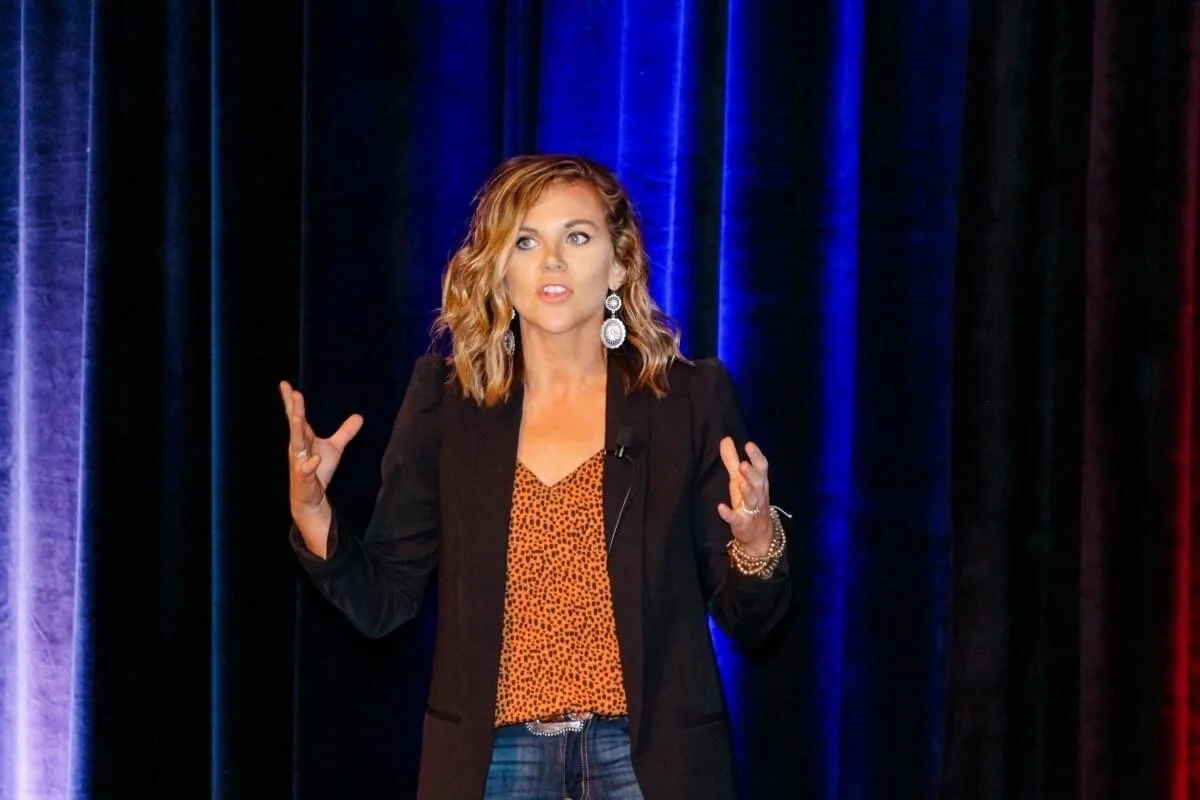Beef Month Q&A with Amanda Radke
Radke speaks on stage.
The name “Amanda Radke” is known far and wide amongst agriculturists who frequent social media. From her factual, intriguing posts about the beef industry to her sleek, ag-focused apparel, I believe she embodies the word “agvocate.”
Radke is a fifth-generation cattle rancher from Mitchell, South Dakota whose family raises registered seedstock - Limousin, Maine Anjou, and Angus cattle. She began writing for BEEF magazine in 2008 and has been heavily involved in studying consumer trends, promoting beef, and fighting bad regulations that would hurt ranchers throughout her career. She often speaks at agricultural conferences on these topics and enjoys reading her ranch-themed children's books at elementary schools and libraries across the country.
I asked Radke and other agricultural industry professionals a series of questions about the beef industry, her answers are given below:
Q: How did you begin your career within the beef industry?
A: I was very active in 4-H and FFA, but my true start in the beef industry began with serving as a National Beef Ambassador in 2006. I spent a year traveling the country promoting beef at various urban events like the Boston Marathon, as an example, and the experience ended with a summer internship in Washington, D.C. with the USDA.
One of Radke’s t-shirt designs.
Q: How has your specific beef journey changed since you began?
A: I started freelance writing in college and spent a decade writing hard news stories for various ag publications. I found I enjoyed column writing much better because I could use my platform to share stories and voice my opinion on important topics. In the past couple of years, my focus has been on the author side of things and promoting ag literacy in schools. I launched a website, www.amandaradke.com, as a place to sell my books, and it kind of blew up from there. I now sell a variety of farm and ranch-themed shirts, gift items, toys, etc., and it's been a lot of fun for me and something I can do while homeschooling our kids. I will also have two new beef cattle books come out in 2021 that I am very excited to share with everybody!
Q: What is the biggest issue facing the beef industry right now?
A: Regulatory pressures that seek to strip ranchers off the land and beef off the dinner table. I'm keeping a close eye on Biden's 30X30 plan, as well as the measures in Colorado and Oregon that would prohibit many animal husbandry practices.
Q: How are you working to combat said issue?
A: The political atmosphere has become very polarized in this country, and it can feel like a losing battle to try and enact change in Washington, D.C. from at home on the ranch. I am focusing on local issues, and I encourage others to do the same. Get involved in the school board. Go to county commissioner meetings. Get to know your local sheriff. Call your elected officials regularly to voice your concerns. Meaningful change starts at home. We all need to get engaged!
Q: In your own words, how does beef help the environment?
A: Cattle help the environment in countless ways! When they graze, they aerate the soil with their hooves, naturally fertilize the land with their manure, participate in the water cycle, upcycle (inedible to humans) cellulosic materials into nutrient-dense beef and life-enriching by-products, and they protect wildlife habitat by ensuring the range isn't tilled for farming or modernized for urban development.
Beef has 10 essential nutrients that promote health and wellness, which can also reduce environmental pressures on the health care side. Cattle are absolutely part of the solution to addressing climate concerns, and the negative rhetoric about cow farts is not based on science, it's a political ideology that ignores reality.
Radke has written multiple children’s books.
Q: how Do you believe beef factors into a healthy diet?
A: Beef contains 10 essential nutrients including zinc, iron, and protein. It also contains heart-healthy and brain-nourishing fats. In just one 3-oz. serving of beef, you receive 25 grams of protein for just 180 calories. One would need to eat cups of broccoli, quinoa, or peanut butter to receive that 25 grams of protein. Beef is satiating, delicious, and nutritious!
Q: What’s your opinion on alternative protein?
A: I welcome more choices for consumers at the grocery store. I disagree that these companies should be able to steal our nomenclature while also disparaging meat to sell their alternative products. There's a larger agenda behind this as evidenced by Bill Gates being one of the largest owners of farmland in the United States today. He has also said that rich nations should move to eating alternative proteins, and coincidentally, he's a major investor in those types of products.
Q: What are some ways ranchers can advocate for the beef industry?
A: Share your story on social media! When you see a negative article, drop a comment with the facts! Get involved in your community. Change hearts and minds by showing people not just what you do but why you're so passionate about it. Be authentic, transparent, kind, and factual. Become a welcoming resource, so people know they can ask you questions. Share recipes, videos from the pasture, etc. Just be you!
Q: Lastly, what’s your advice to someone wanting to break-into the beef industry?
A: My best advice is to get involved by attending meetings and conferences and meeting as many people as you can. Job shadow or get an internship with an individual or company who you could envision yourself working with. Study the different segments of the industry to discover where your passions lie. Jump in with both feet! We need more talented people involved in our industry and joining in the fight to protect it!




